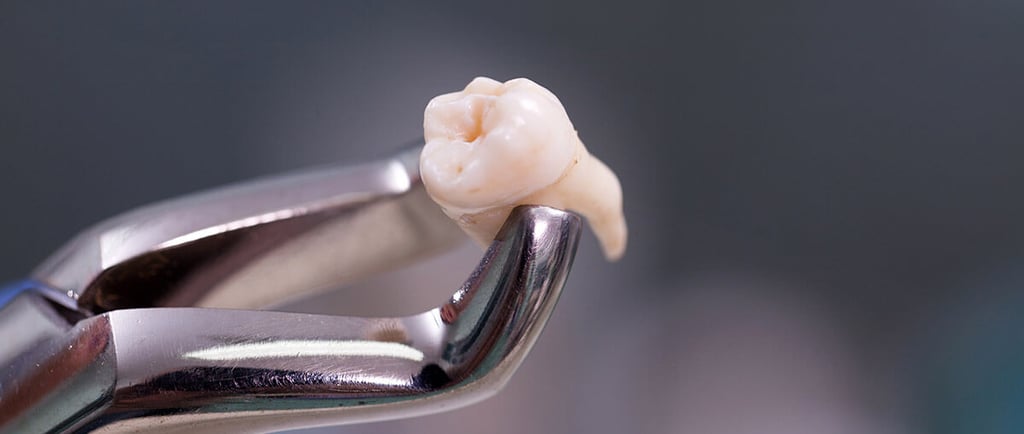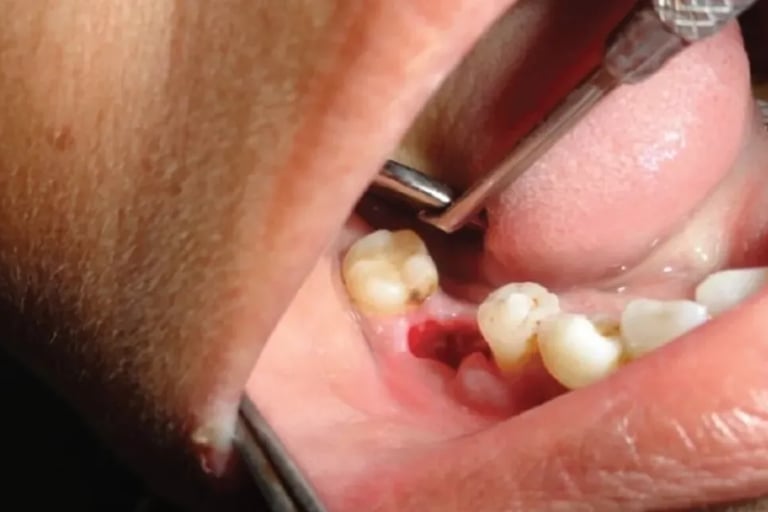SMILE- It costs nothing !!!
Tooth Extraction Procedure : Healing and after-care
2/12/2024


Tooth Extraction Procedure
Tooth extraction is a common dental procedure that many people will encounter at some point in their lives. Whether it's due to severe decay, infection, overcrowding, or the need to make room for orthodontic treatment, the removal of a tooth can be both a daunting and necessary experience.
However, understanding the process, potential reasons for extraction, and what to expect during and after the procedure can help alleviate anxiety and ensure a smoother experience.
In this comprehensive guide, we'll delve into the world of tooth extraction, covering everything from reasons for extraction to post-operative care tips.
Tooth extraction is a dental procedure in which a tooth is removed from its socket in the jawbone.
This procedure is typically performed by a dentist or an oral surgeon. Tooth extraction may be necessary for various reasons, including severe tooth decay, gum disease, overcrowding, or to prepare for orthodontic treatment.
When is a Tooth Extracted?
A tooth may need to be extracted for several reasons:
Severe tooth decay: If a tooth is extensively decayed and cannot be saved with a filling or a crown, extraction may be necessary.
Gum disease: Advanced gum disease can cause the supporting tissues and bone around a tooth to deteriorate, making extraction necessary.
Overcrowding: In some cases, teeth may need to be extracted to create space for orthodontic treatment.
Impacted wisdom teeth: Wisdom teeth, also known as third molars, often become impacted and can cause pain, infection, or damage to adjacent teeth.
Orthodontic treatment: In certain cases, teeth may need to be extracted to make room for the alignment of the remaining teeth.
RELATED : How is an impacted wisdom tooth extracted ?
The Cost and Procedure for Tooth Extraction
The cost of tooth extraction can vary depending on factors such as the complexity of the extraction, the location of the tooth, and the dental professional performing the procedure.
In general, On average, the cost of a simple tooth extraction in India ranges from approximately ₹500 to ₹3000 INR per tooth.
For more complex extractions, such as impacted wisdom teeth or teeth with extensive decay, the cost may be higher and can range from ₹2000 to ₹8000 INR per tooth or more, depending on the specific circumstances and treatment required.
The tooth extraction procedure typically involves the following steps:
Anesthesia: Local anesthesia is administered to numb the area around the tooth to be extracted. In some cases, general anesthesia may be used for complex extractions or if the patient has anxiety.
Loosening the tooth: The dentist or oral surgeon uses special instruments to gently loosen the tooth from its socket.
Extraction: Once the tooth is sufficiently loosened, it is carefully removed from the socket using forceps or a dental elevator.
Stitches (if needed): In some cases, stitches may be required to close the wound. These stitches are usually self-dissolving and do not need to be removed.
RELATED :Tooth extraction Removal Cost In India
What happens when a tooth is extracted ?
Healing Time and Stages of Extracted Wound
The healing time after a tooth extraction can vary depending on the complexity of the extraction and the individual's healing ability.
In general, the initial healing period takes about 1-2 weeks. However, complete healing of the extraction site can take several months.
The stages of the healing process include:
Blood clot formation: After the extraction, a blood clot forms in the socket to protect the underlying bone and nerves.
Initial healing: Over the next few days, the blood clot is gradually replaced by granulation tissue, which helps in the formation of new bone and gum tissue.
Socket preservation: The socket begins to fill with new bone, and the gum tissue starts to close the extraction site.
Complete healing: Over time, the socket is completely filled with new bone, and the gum tissue fully closes the extraction site.
Complications of Tooth Extraction
While tooth extraction is generally a safe procedure, there are some potential complications that can occur:
Dry socket: This occurs when the blood clot in the extraction site becomes dislodged or dissolves, exposing the underlying bone and nerves. It can cause severe pain and delay the healing process.
Infection: Infection can occur if bacteria enter the extraction site. Symptoms may include pain, swelling, and discharge.
Nerve damage: In rare cases, the nerves near the extraction site may be damaged during the procedure, leading to numbness or tingling in the lips, tongue, or chin.
Bleeding: Some bleeding is normal after a tooth extraction, but excessive or prolonged bleeding may require medical attention .
RELATED : How to choose a right toothpaste ?
Aftercare and Things to Avoid after Extraction
Proper aftercare is crucial for promoting healing and preventing complications after a tooth extraction.
Here are some important aftercare instructions:
Gently bite down on the gauze pad placed by your dentist to control bleeding. Replace the gauze as needed.
Avoid rinsing or spitting forcefully for the first 24 hours to prevent dislodging the blood clot.
Avoid drinking through a straw, smoking, or consuming hot liquids for at least 24 hours, as these activities can increase the risk of dry socket.
Take prescribed pain medications as directed by your dentist to manage any discomfort.
Apply an ice pack to the outside of your cheek in the first 24 hours to reduce swelling.
Stick to soft foods and avoid chewing on the extraction site until it is fully healed.
Maintain good oral hygiene by gently brushing your teeth and tongue, but avoid the extraction site.
Common Questions
1. How Painful is Tooth Extraction?
During the tooth extraction procedure, you will be under the effect of anesthesia, so you should not feel any pain.
However, it is common to experience some discomfort and mild pain after the procedure. Your dentist will provide you with pain medication to manage any post-extraction pain.
2. How Safe is Tooth Extraction?
Tooth extraction is generally considered a safe procedure when performed by a qualified dental professional.
However, as with any medical procedure, there are some risks and potential complications. It is important to follow your dentist's instructions for aftercare to minimize the risk of complications.
3. What is Emergency Tooth Extraction?
Emergency tooth extraction refers to the extraction of a tooth that needs to be removed immediately due to severe pain, infection, or trauma. This procedure is typically performed to alleviate the patient's discomfort and prevent further complications.
4. How is Wisdom Tooth Extracted?
Wisdom tooth extraction is a common dental procedure. If the wisdom tooth is fully erupted, it can be extracted similarly to any other tooth.
However, if the wisdom tooth is impacted, meaning it has not fully erupted, a surgical extraction may be necessary. The dentist or oral surgeon will make an incision in the gum tissue to access the tooth and remove it.
In conclusion, tooth extraction is a common dental procedure aimed at addressing various oral health issues, from severe decay to overcrowding and impacted wisdom teeth.
While the thought of having a tooth pulled may seem intimidating, understanding the process and knowing what to expect can help alleviate anxiety and ensure a smoother experience.



Contact Smiles
drdeepi15@gmail.com
Dr. Deepika B.D.S
© 2025 SmileWide Dental. All Rights Reserved.
Have doubts ..?
